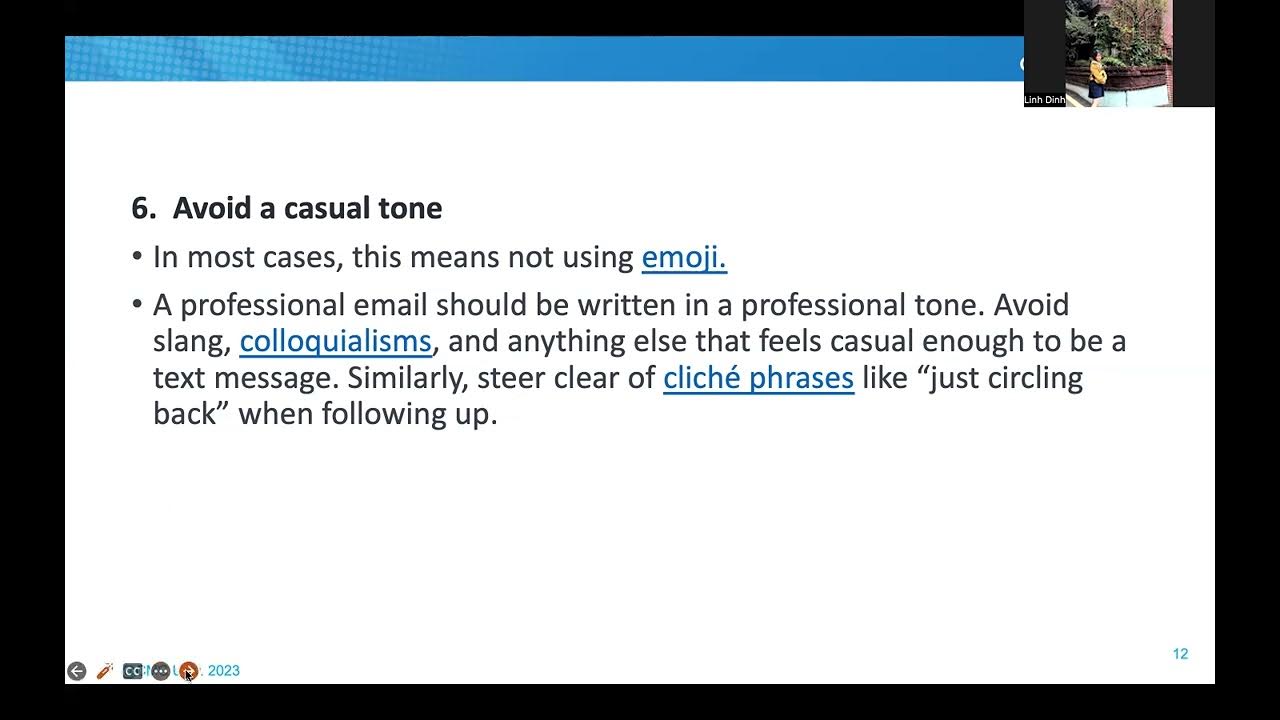How to write an Email in English: FORMAL & INFORMAL - Real Life English Conversation
Summary
TLDRIn this lesson, viewers learn how to write effective emails, focusing on the difference between formal and informal email styles. The video highlights common mistakes in workplace emails, such as missing subject lines, using inappropriate language, and forgetting attachments. It provides practical tips on writing formal emails, including clear subject lines, appropriate greetings, and professional signatures. It also teaches how to write informal emails to friends, emphasizing a relaxed tone and structure. The lesson equips viewers with essential email-writing skills, helping them navigate both professional and personal communication with confidence.
Takeaways
- 😀 Always include a subject line in your email to clearly indicate the purpose of your message.
- 😀 Use formal language in workplace emails to maintain a professional tone and avoid inappropriate words.
- 😀 Always double-check for spelling mistakes and ensure that your email is free of errors.
- 😀 Attach any relevant documents to your email and remember to include recipients in CC or BCC if needed.
- 😀 Create a professional email signature that includes your full name, job title, phone number, and website link.
- 😀 Use a professional email address provided by your company for work-related communication.
- 😀 Be cautious when using 'Reply All' in emails, as it sends your response to both the sender and all other recipients.
- 😀 Start emails with appropriate greetings, avoiding slang, overly friendly, or overly formal language.
- 😀 Always be mindful of cultural differences when emailing foreign clients to prevent misunderstandings.
- 😀 Before sending an email, always review the content to ensure it is clear, concise, and professional.
- 😀 Informal emails to friends should have a casual tone, with simple greetings and an informal structure, such as starting with 'Hi' and using a friendly sign-off.
Q & A
What are some common mistakes made when writing formal emails in the workplace?
-Common mistakes include leaving the subject line blank, using inappropriate language, forgetting to attach documents, not CCing or BCCing the right people, and making spelling errors. Also, a professional email signature is often missing.
Why is a subject line important in a formal email?
-A subject line is crucial because it informs the recipient of the purpose of the email. Without it, the recipient might not understand the email's relevance or urgency.
What should be included in a professional email signature?
-A professional email signature should include your full name, job title, a photo, a direct phone number, and a hyperlink to your company or personal website.
What are the risks of using the 'Reply All' function in emails?
-Using 'Reply All' can result in sending an unnecessary email to a large group of people, which may lead to confusion or clutter in everyone's inbox. It's important to use this function carefully and only when necessary.
How can one write a professional email greeting?
-A professional greeting should be formal and respectful, avoiding slang or overly casual language. Common examples include 'Dear [Recipient's Name]' or 'Hello [Recipient's Name]'.
What role does cultural awareness play in writing emails to foreign clients?
-Cultural awareness is crucial when emailing foreign clients to avoid misunderstandings or causing offense. Different cultures may have different expectations for tone, formality, and content.
What is the key difference between formal and informal emails?
-Formal emails are used in professional or official settings and require proper structure, tone, and language, whereas informal emails are casual, used among friends or acquaintances, and can be less structured and more conversational.
Why should one always double-check an email before sending it?
-Double-checking ensures that there are no mistakes, such as spelling errors, incorrect information, or missing attachments. It also helps ensure the tone and format are appropriate for the recipient.
What advice did Anna give Natalie regarding the use of email addresses in the workplace?
-Anna advised Natalie to use a professional email address provided by the company for all work-related matters, and to avoid using it for personal communication.
What mistake did Natalie make in her email when trying to contact her friend?
-Natalie wrote the email in an overly formal tone, making it sound like she was inviting a president over, which was inappropriate for a friendly email to a close friend.
Outlines

This section is available to paid users only. Please upgrade to access this part.
Upgrade NowMindmap

This section is available to paid users only. Please upgrade to access this part.
Upgrade NowKeywords

This section is available to paid users only. Please upgrade to access this part.
Upgrade NowHighlights

This section is available to paid users only. Please upgrade to access this part.
Upgrade NowTranscripts

This section is available to paid users only. Please upgrade to access this part.
Upgrade NowBrowse More Related Video

HOW TO WRITE A FORMAL LETTER / EMAIL IN ENGLISH | CAMBRIDGE EXAM WRITING STRUCTURE

How To Write An Informal Email In English (Easily!)

(LEVEL 6-EPS 2): WRITING SKILLS: Formal email

How to Write a Formal Email | Digital Literacy | Twinkl USA

How to Write Perfect English Emails with ChatGPT

Surat Pribadi dan Surat Resmi Bahasa Indonesia Kelas 7 Semester 2 Kurikulum Merdeka
5.0 / 5 (0 votes)